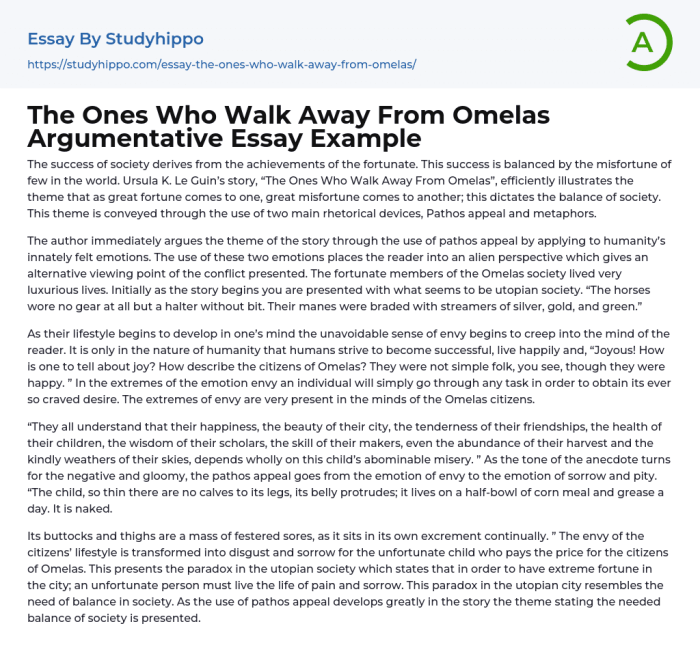The ones who walk away from omelas quotes – In Ursula K. Le Guin’s haunting short story “The Ones Who Walk Away from Omelas,” the titular quote serves as a poignant meditation on the tension between individual responsibility and collective well-being. This essay delves into the profound ethical, psychological, and social implications of this enigmatic phrase, examining its impact on the characters within the story and its relevance to contemporary society.
The story presents a thought-provoking ethical dilemma: a utopian city of Omelas thrives only through the perpetual suffering of a single child. Those who witness this injustice face a choice—to remain complicit in the city’s prosperity or to walk away in protest.
The quote “the ones who walk away from Omelas” captures the profound moral weight of this decision and its potential consequences.
Literary Significance

In Ursula K. Le Guin’s short story “The Ones Who Walk Away from Omelas,” the titular quote symbolizes the profound tension between individual responsibility and collective well-being. The quote encapsulates the moral dilemma of choosing to ignore suffering for the sake of preserving a harmonious society.
The short story presents a utopian society, Omelas, where the happiness and prosperity of its citizens are built upon the secret suffering of a single child. The quote, “The ones who walk away from Omelas,” represents those who grapple with the moral implications of this arrangement and ultimately decide to leave the city in search of a more just and compassionate existence.
Ethical Implications: The Ones Who Walk Away From Omelas Quotes

Analyzing the Ethical Dilemma
The quote poses a profound ethical dilemma: is it justifiable to turn a blind eye to suffering if it benefits the greater good? The story challenges the notion that the happiness of the majority can be built upon the suffering of the few.
Consequences of Walking Away
Walking away from suffering or injustice can have significant consequences. It can involve sacrificing personal comfort, social acceptance, or even safety. However, it can also lead to a sense of personal growth and fulfillment, as well as the potential to inspire social change.
Responsibility of Individuals
The quote emphasizes the responsibility of individuals to confront and address societal problems. It suggests that it is not enough to simply ignore or evade suffering; individuals have a moral obligation to work towards creating a more just and equitable society.
Psychological Impact
Guilt, Shame, and Isolation
Walking away from Omelas can have a profound psychological impact on those who do so. They may experience feelings of guilt, shame, and isolation for abandoning a society that relies on their suffering.
Personal Growth and Transformation
However, walking away can also lead to personal growth and transformation. It can force individuals to confront their own values and beliefs, and it can inspire them to become more compassionate and empathetic.
Social Commentary
Treatment of Suffering
The quote serves as a commentary on society’s often-callous treatment of suffering. It exposes the tendency of individuals and institutions to ignore or evade responsibility for the well-being of others.
Inspiration for Change
The quote has the potential to inspire social change and activism. It can remind individuals of their responsibility to speak out against injustice and to work towards creating a more compassionate society.
Literary Analysis

Perspectives of Those Who Walk Away, The ones who walk away from omelas quotes
The story presents two distinct perspectives: those who walk away from Omelas and those who remain. Those who walk away are driven by a sense of moral outrage and a desire for justice. Those who remain are content with the status quo, valuing the happiness of the majority over the suffering of the one.
Literary Devices
Le Guin employs various literary devices to convey the complex emotions and ideas surrounding the quote. Symbolism, allegory, and foreshadowing are used to explore the themes of suffering, responsibility, and the nature of human choice.
Structure and Symbolism
The structure of the short story reinforces the theme of walking away. The story begins with a description of the utopian society of Omelas, but it gradually shifts its focus to the growing discomfort of those who cannot ignore the suffering of the child.
The ending of the story leaves the reader with a sense of ambiguity, suggesting that the journey of those who walk away is ongoing.
Personal Reflection

The quote, “The ones who walk away from Omelas,” has had a profound impact on my understanding of responsibility, empathy, and the nature of suffering. It has challenged me to question my own values and beliefs, and it has inspired me to become more compassionate and empathetic towards others.
The quote has also influenced my choices and actions. It has motivated me to speak out against injustice and to work towards creating a more just and equitable society. I believe that the quote is a powerful reminder of our responsibility to care for one another, even when it is difficult or uncomfortable.
Essential Questionnaire
What is the significance of the child’s suffering in Omelas?
The child’s suffering serves as a symbol of the hidden costs of societal well-being and the ethical compromise that may be necessary to maintain a seemingly perfect society.
How does the quote reflect the tension between individual responsibility and collective well-being?
The quote highlights the moral dilemma of choosing between personal integrity and the preservation of a larger society. It forces individuals to grapple with their own complicity in injustice and the potential consequences of their actions.
What is the psychological impact of walking away from Omelas?
Walking away from Omelas can evoke feelings of guilt, shame, and isolation. However, it can also lead to personal growth and a deeper understanding of one’s own values and responsibilities.